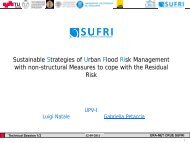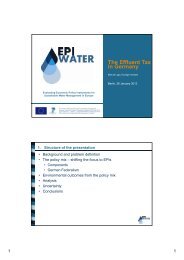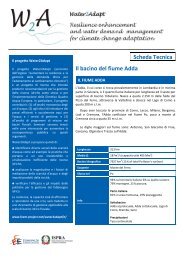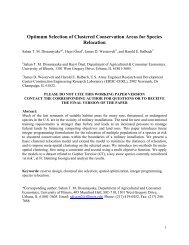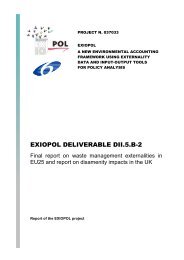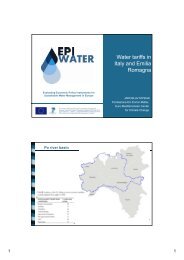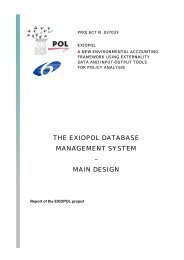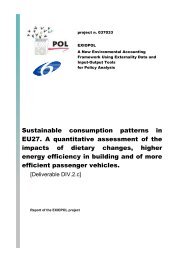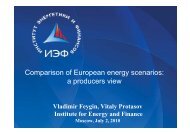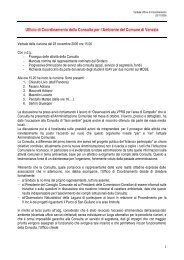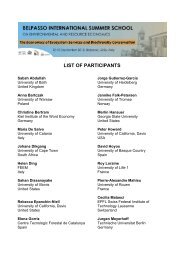Gulf and European Energy Supply Security - Feem-project.net
Gulf and European Energy Supply Security - Feem-project.net
Gulf and European Energy Supply Security - Feem-project.net
Create successful ePaper yourself
Turn your PDF publications into a flip-book with our unique Google optimized e-Paper software.
<strong>Energy</strong> <strong>Security</strong>: Potential for EU-GCC Cooperation<br />
as there are no foreign companies that may be<br />
nationalized. More likely, attention will focus on<br />
export levels, <strong>and</strong> a more conservationist approach<br />
may emerge. This would be in line with the<br />
experience of Iran at the time of the revolution, <strong>and</strong><br />
with the experiences of Venezuela <strong>and</strong> Bolivia.<br />
Political change may be instrumental in<br />
provoking shifts in that direction, unless sufficient<br />
incentives exist in the global economic environment<br />
to discourage this tendency. Policy shifts in this<br />
direction are more likely to be associated with<br />
changes in power, including by constitutional means,<br />
<strong>and</strong> are frequently associated with the electoral<br />
success of populist leaders, but also may very well<br />
be associated with the passage of power from one<br />
to another member of a ruling family.<br />
The experience of Iraq since 2003 is extremely<br />
telling of prevailing trends. Notwithst<strong>and</strong>ing<br />
the collapse of the Saddam Hussein regime <strong>and</strong><br />
the occupation of the country by foreign forces,<br />
followed by the progressive empowerment<br />
of a new constitutional order amidst multiple<br />
contradictions <strong>and</strong> uncertainties, we have not<br />
witnessed the unrestrained opening of the<br />
hydrocarbons sector <strong>and</strong> the rapid build-up of<br />
production <strong>and</strong> exports that was touted by some<br />
on the eve of the coalition’s intervention. However,<br />
the situation of the Kurdish province of Iraq differs<br />
from the rest because of the profoundly different<br />
political history <strong>and</strong> the long-st<strong>and</strong>ing experience<br />
of autonomy from Baghdad.<br />
Conclusions <strong>and</strong> Indications for Scenariobuilding<br />
The analysis in this first section has shown that<br />
there is no easy <strong>and</strong> immediate connection between<br />
resource nationalism or political instability <strong>and</strong><br />
global supply of oil <strong>and</strong> gas. This is definitely not<br />
because political developments are irrelevant in<br />
influencing oil <strong>and</strong> gas supplies, but because this<br />
influence is highly variable <strong>and</strong> unpredictable.<br />
Political factors act as one of the elements<br />
which prevent the oil <strong>and</strong> gas upstream industry<br />
from behaving in a perfectly economic-rational way,<br />
optimizing supply at all times.<br />
Political circumstances may influence the gap<br />
between maximum optimal production <strong>and</strong> what is<br />
actually achieved, <strong>and</strong> let it widen or narrow down.<br />
The existence of conditions of financial stability<br />
<strong>and</strong> growth is crucially important in determining<br />
the attitude of producing countries towards the<br />
desirable level of production <strong>and</strong> exports.<br />
Similarly, expectations about the future level of<br />
oil <strong>and</strong> gas prices also influence political attitudes<br />
towards oil <strong>and</strong> gas production <strong>and</strong> exports. If the<br />
market expects that supply will grow progressively<br />
scarcer in the face of growing dem<strong>and</strong>, then the<br />
incentive to slow down production <strong>and</strong> exports<br />
is increased. The adoption of aggressive policies<br />
aimed at decarbonisation <strong>and</strong> energy efficiency may<br />
have an ambivalent effect: there may be a negative<br />
announcement effect, because producers will fear<br />
dem<strong>and</strong> destruction <strong>and</strong> invest less in exp<strong>and</strong>ing or<br />
maintaining capacity; <strong>and</strong> a positive market effect,<br />
when dem<strong>and</strong> is effectively reduced, ceteris paribus.<br />
Hence the suggestion might be not to entertain policy<br />
objectives which cannot realistically be reached <strong>and</strong><br />
emphasise cooperation <strong>and</strong> pragmatism rather than<br />
confrontation <strong>and</strong> maximalism.<br />
It has been seen that political instability <strong>and</strong><br />
resource nationalism have been rarely been<br />
associated with acute supply crises or shortfalls.<br />
Their effect is rather gradual <strong>and</strong> normally<br />
compensated by action in other parts of the system.<br />
Today, the system appears quite flexible <strong>and</strong> capable<br />
of withst<strong>and</strong>ing even important shocks, primarily<br />
thanks to excess capacity available in Saudi Arabia.<br />
But if Saudi Arabia itself were to experience severe<br />
political crises, problems may arise even today. For<br />
the longer term, the danger that capacity additions<br />
may fall systematically short of dem<strong>and</strong> increases<br />
exists <strong>and</strong> would entail a progressive fragilisation of<br />
the system.<br />
2. Domestic/International Conflicts <strong>and</strong><br />
terrorist Activities<br />
We shall distinguish between three main<br />
categories of armed conflict: 1) “classic” interstate<br />
warfare, which is fought primarily by regular armies;<br />
2) civil wars, in which armed forces from opposing<br />
sides within the same country engage in violent<br />
encounters; <strong>and</strong> 3) terrorism/b<strong>and</strong>itry.



